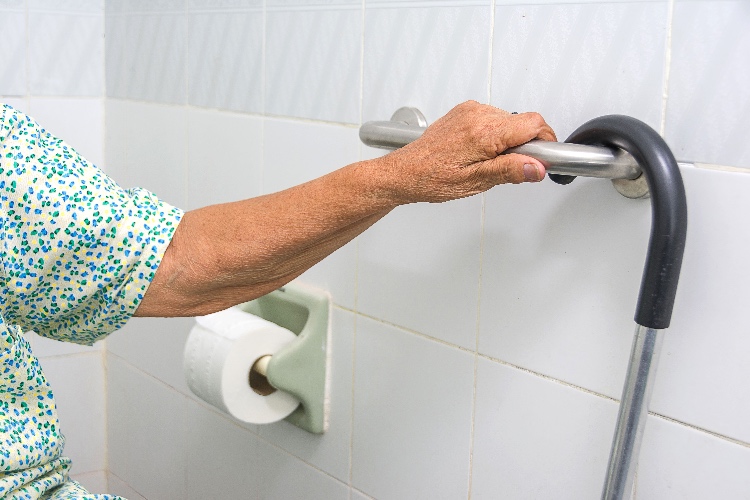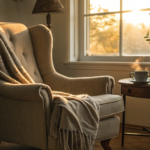
Home safety is paramount for seniors. As we age, our bodies and abilities change, making us more susceptible to accidents and injuries. Ensuring a safe living environment can greatly enhance the quality of life for seniors and help prevent traumatic injuries.
Table of Contents:
- Fall Prevention
- Fire Safety
- Medication Management
- Home Security
- Bathroom Safety
- Kitchen Safety
- Ensuring a Safe and Comfortable Home for Seniors
- FAQs
Fall Prevention
Falls are a leading cause of injury among seniors. A study done by the CDC found 28.7% of adults over the age of 65 reported falling at least once in the last 12 months. Here are some steps to reduce the risk of falls:
Installing Grab Bars and Handrails
Installing grab bars in strategic locations, such as bathrooms next to toilets and in showers, can provide significant support and stability for seniors. Handrails along staircases are equally important, ensuring that seniors have something sturdy to hold onto as they navigate up and down the stairs. The placement of these aids should be at heights easily accessible for seniors, taking into account their specific needs and physical limitations.
Ensuring Proper Lighting
Proper lighting is essential in preventing falls. Bright, clear lighting should be used in all areas of the home to improve visibility. Nightlights in hallways, bathrooms, and bedrooms can provide necessary illumination during nighttime, reducing the risk of tripping over unseen obstacles. Motion sensor lights are an excellent addition, as they automatically turn on when someone enters a room, ensuring that the path is always well-lit without the need for manual switches
Using Non-Slip Mats and Rugs
Non-slip mats are particularly important in areas prone to wetness, such as bathrooms and kitchens. Placing non-slip mats inside and outside the shower can help prevent slips. Using rug pads under all rugs ensures they stay in place and do not become a tripping hazard. Opting for flooring materials with non-slip textures in areas prone to wetness adds an extra layer of safety.
Fire Safety
Fire safety is another critical aspect of home safety for seniors. The U.S Fire Administration notes that adults 65 years are twice as likely to be killed or injured by fires. Here are some essential tips:
Installing Smoke and Carbon Monoxide Detectors
Smoke detectors should be installed in every bedroom, outside sleeping areas, and on every level of the home. Carbon monoxide detectors are equally important and should be placed near sleeping areas and in rooms with fuel-burning appliances. Regular testing of all detectors is essential to ensure they are functioning properly. Batteries should be replaced at least once a year, and detectors should be replaced every 10 years to maintain their effectiveness.
Safe Use of Electrical Appliances
Regularly checking electrical appliances for frayed cords and replacing them if necessary can prevent electrical fires. Overloading electrical outlets should be avoided to reduce the risk of fire. Unplugging appliances when not in use is a simple yet effective way to reduce the risk of electrical fires. Using appliances with automatic shut-off features adds an extra layer of safety.
Regular Maintenance of Heating Systems
Having heating systems inspected annually by a professional ensures they are in good working condition. Space heaters should have automatic shut-off features and should be placed away from flammable materials. Proper ventilation for all heating systems is crucial to prevent carbon monoxide buildup, which can be deadly if undetected.
Medication Management
Proper medication management can prevent serious health complications for seniors. Here’s how to ensure medications are handled safely:
Proper Storage of Medications
Medications should be kept in their original containers with clear labels to prevent mix-ups. Storing medications in a cool, dry place away from direct sunlight and moisture helps maintain their efficacy. Medications should be stored at a height easily reachable for the senior to ensure they can access them without difficulty.
Setting Up Medication Reminders
Pill organizers with compartments for each day of the week can simplify medication schedules and ensure that seniors take the right doses at the right times. Setting alarms on clocks, phones, or medication reminder devices can prompt timely medication intake. Smart medication dispensers that alert caregivers if a dose is missed are also a valuable tool for ensuring adherence to medication schedules.
Regular Review of Medications with Healthcare Providers
Scheduling regular reviews with healthcare providers to discuss current medications and any potential side effects or interactions is essential. Keeping an updated list of all medications, including dosages and schedules, to share with healthcare providers helps ensure that they have all the information needed to make informed decisions. Open communication with doctors about any concerns or side effects experienced is crucial for maintaining health and safety.
Safe Disposal of Expired or Unused Medications
Utilizing local medication disposal programs or drop-off locations ensures that unused or expired medications are disposed of safely. Medications should not be flushed down the toilet unless specified by the label. Medication disposal kits that deactivate drugs before discarding them in the trash are a safe and effective way to dispose of unwanted medications.
Home Security
Ensuring home security can provide peace of mind for seniors and their families. Here are some effective measures:
Installing Security Systems and Cameras
A comprehensive security system that includes alarms, motion detectors, and cameras can significantly enhance home security. In a study from the U.S Department of Justice, 93% of crime experienced by the elderly is property crime. Security cameras should be placed at entry points and around the perimeter of the home to monitor activity. Opting for a monitored security system that alerts authorities in case of emergencies provides an additional layer of protection.
Securing Doors and Windows
Deadbolt locks on all exterior doors add an extra level of security, making it more difficult for intruders to gain access. Ensuring that all windows have secure locks and adding window alarms can further enhance safety. Peepholes or doorbell cameras should be installed to allow seniors to see who is at the door before opening it, reducing the risk of opening the door to strangers.
Bathroom Safety
Bathrooms can be particularly hazardous for seniors. Implementing these safety measures can help prevent accidents:
Installing Walk-In Tubs and Showers
Walk-in tubs and showers with low thresholds make it easier for seniors to enter and exit without tripping. Non-slip surfaces and built-in seating provide additional safety and comfort. Installing handheld showerheads and adjustable-height fixtures allows seniors to bathe comfortably while seated.
Using Shower Chairs and Bath Mats
Shower chairs provide a safe place for seniors to sit while bathing, reducing the risk of slips and falls. Non-slip bath mats inside and outside the shower prevent slipping on wet surfaces. Ensuring that all bath mats have a secure grip and are properly placed adds an extra layer of safety.
Accessible Toilet and Sink Heights
Installing raised toilet seats or safety frames around the toilet makes it easier for seniors to sit and stand. Adjustable or wall-mounted sinks at a comfortable height prevent unnecessary bending or stretching. Placing grab bars near the toilet and sink provides additional support and stability.
Kitchen Safety
The kitchen can pose several risks for seniors. Here are some tips to enhance safety:
Safe Cooking Practices
Encouraging seniors to never leave cooking unattended reduces the risk of kitchen fires. Setting timers helps remind them when food is done cooking. Wearing fitted clothing while cooking prevents garments from catching fire on stovetops. Keeping flammable items away from heat sources and using stove guards can further enhance kitchen safety.
Organizing Kitchen Layout for Easy Access
Storing frequently used items within easy reach prevents unnecessary stretching or climbing, reducing the risk of falls. Keeping counters clear of clutter provides ample workspace and minimizes the risk of knocking things over. Using clear, labeled containers for food storage makes it easy to identify contents and reduces the risk of accidents.
Proper Storage of Kitchen Supplies
Storing knives and other sharp objects in secure, easily accessible locations prevents accidental cuts. Placing heavy items on lower shelves eliminates the need for lifting, which can cause injury. Using shatterproof containers reduces the risk of broken glass, making the kitchen a safer environment.
Fire Prevention in the Kitchen
According to the American Burn Association, adults 65 and older are at much higher risk of injury and death from a kitchen fire. Keeping a fire extinguisher in the kitchen ensures that it is easily accessible in case of emergencies. Installing smoke alarms near the kitchen and regularly checking them ensures they are functioning properly. Using appliances with automatic shut-off features and keeping them in good working condition reduces the risk of kitchen fires.
Ensuring a Safe and Comfortable Home for Seniors
Ensuring the safety and well-being of our elderly loved ones at home is of utmost importance. From fall prevention to fire safety, these measures are designed to protect and enhance the lives of our aging population. The National Council of Aging has also created a printable home safety checklist!
Families and caregivers can also play a vital role in maintaining home safety. Regular check-ins, open communication, and proactive measures can prevent accidents and improve the quality of life for seniors.
At Blue Moon Senior Counseling, we are committed to supporting seniors through life’s challenges. Our licensed therapists provide compassionate counseling, helping seniors navigate changes and promoting their emotional health and well-being. If you or a loved one could benefit from our services, make sure to contact us today!
FAQs
- What are the most common home hazards for seniors?
The most common home hazards for seniors include falls caused by slippery floors, loose rugs, and poor lighting; fires resulting from unattended cooking and faulty electrical appliances; medication issues such as improper storage and missed doses; and security risks like unlocked doors and windows, and scams targeting seniors.
- How can I make my bathroom safer for my elderly parent?
To make the bathroom safer for your elderly parent, install grab bars near the toilet and shower, use non-slip mats inside and outside the shower, consider a walk-in tub for easier access, and ensure good lighting to prevent falls.
- What should I do if my elderly relative is struggling with medication management?
If your elderly relative is struggling with medication management, use a pill organizer to keep track of daily doses, set reminders with alarms or smart devices, consult a healthcare provider for regular medication reviews, and dispose of old medications safely through disposal programs.
- How can Blue Moon Senior Counseling help with emotional well-being?
Blue Moon Senior Counseling helps with emotional well-being by providing supportive counseling to deal with life changes and challenges, offering educational resources to understand and manage mental health, utilizing telehealth services for convenient access to counselors, and delivering personalized care tailored to individual needs.
- What are some effective ways to prevent falls in the home?
Effective ways to prevent falls in the home include installing grab bars and handrails in key areas, improving lighting throughout the home, removing tripping hazards like loose rugs and clutter, and using non-slip mats in bathrooms and kitchens.


